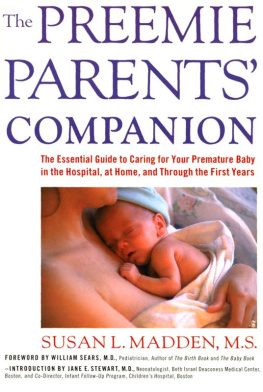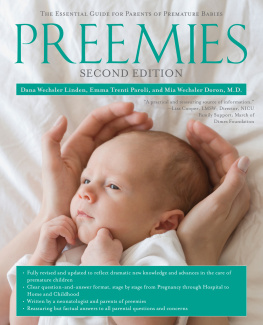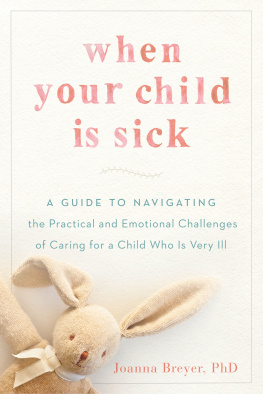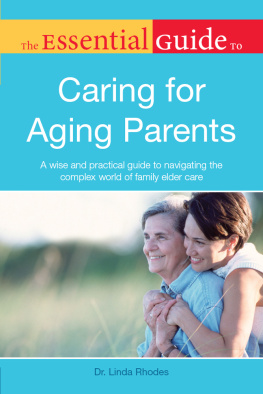Susan Madden - The Preemie Parents Companion: The Essential Guide to Caring for Your Premature Baby in the Hospital, at Home, and Through the First Years
Here you can read online Susan Madden - The Preemie Parents Companion: The Essential Guide to Caring for Your Premature Baby in the Hospital, at Home, and Through the First Years full text of the book (entire story) in english for free. Download pdf and epub, get meaning, cover and reviews about this ebook. year: 2000, publisher: Harvard Common Press, genre: Children. Description of the work, (preface) as well as reviews are available. Best literature library LitArk.com created for fans of good reading and offers a wide selection of genres:
Romance novel
Science fiction
Adventure
Detective
Science
History
Home and family
Prose
Art
Politics
Computer
Non-fiction
Religion
Business
Children
Humor
Choose a favorite category and find really read worthwhile books. Enjoy immersion in the world of imagination, feel the emotions of the characters or learn something new for yourself, make an fascinating discovery.
- Book:The Preemie Parents Companion: The Essential Guide to Caring for Your Premature Baby in the Hospital, at Home, and Through the First Years
- Author:
- Publisher:Harvard Common Press
- Genre:
- Year:2000
- Rating:3 / 5
- Favourites:Add to favourites
- Your mark:
- 60
- 1
- 2
- 3
- 4
- 5
The Preemie Parents Companion: The Essential Guide to Caring for Your Premature Baby in the Hospital, at Home, and Through the First Years: summary, description and annotation
We offer to read an annotation, description, summary or preface (depends on what the author of the book "The Preemie Parents Companion: The Essential Guide to Caring for Your Premature Baby in the Hospital, at Home, and Through the First Years" wrote himself). If you haven't found the necessary information about the book — write in the comments, we will try to find it.
The essential guide to caring for a preemie in the hospital, at home, and through the first years.
Susan Madden: author's other books
Who wrote The Preemie Parents Companion: The Essential Guide to Caring for Your Premature Baby in the Hospital, at Home, and Through the First Years? Find out the surname, the name of the author of the book and a list of all author's works by series.
The Preemie Parents Companion: The Essential Guide to Caring for Your Premature Baby in the Hospital, at Home, and Through the First Years — read online for free the complete book (whole text) full work
Below is the text of the book, divided by pages. System saving the place of the last page read, allows you to conveniently read the book "The Preemie Parents Companion: The Essential Guide to Caring for Your Premature Baby in the Hospital, at Home, and Through the First Years" online for free, without having to search again every time where you left off. Put a bookmark, and you can go to the page where you finished reading at any time.
Font size:
Interval:
Bookmark:
The information and suggestions offered in this book should be used in conjunction with, but not as a replacement for, the medical care you receive from your professional healthcare providers.
The Harvard Common Press
535 Albany Street
Boston, Massachusetts 02118
www.harvardcommonpress.com
Copyright 2000 by Susan L. Madden
Foreword copyright 2000 by William Sears, M.D.
Introduction copyright 2000 by Jane E. Stewart, M.D.
Illustrations copyright 2000 by Kathleen Gray Farthing
All rights reserved. No part of this publication may be reproduced or transmitted in any form or by any means, electronic or mechanical, including photocopying, recording, or any information storage or retrieval system, without permission in writing from the publisher.
Printed in the United States of America
Printed on acid-free paper
Library of Congress Cataloging-in-Publication Data
Madden, Susan L.
The preemie parents' companion : the essential guide to caring for your premature baby in the hospital, at home, and through the first years / Susan L. Madden ; foreword by William Sears ; introduction by Jane E. Stewart.
p. cm.
Includes bibliographical references and index.
ISBN 1-55832-134-9 (hc. : alk. paper). ISBN 1-55832-135-7
(pbk. : alk. paper)
1. Infants (Premature) 2. Infants (Premature)Care. 3. Infants (Premature)Development. I. Title.
RJ250.3.M34 2000
618.92'011dc21 99-25790
ISBN-13: 978-1-55832-135-9 CIP
Special bulk-order discounts are available on this and other Harvard Common Press books. Companies and organizations may purchase books for premiums or for resale, or may arrange a custom edition, by contacting the Marketing Director at the address above.
Cover photograph by Michele McDonald
Cover design by Suzanne Noli
Text design by Joyce C. Weston
Illustrations by Kathleen Gray Farthing
Any photograph not specifically credited is courtesy of the author.
10 9 8 7 6 5
To my late father, Donald B. Leach,
whose integrity and independence of mind remain an inspiration
and
To my children, Megan, Charlie, and Philip
by William Sears, M.D.
A premature baby is deprived of the final weeks or months inside the womb. Instead, the babyespecially one with medical problems needing weeks or months of intensive caregrows in an "outside womb," where parents can watch and share in the care. While newborn intensive care units improve survival and well-being, it's easy for parents to feel displaced from the care of their baby. Care of preemies is a team approachand parents are a valuable part of this team. The Preemie Parents' Companion shows parents how to be an indispensable part of the medical team.
When I was director of a premature nursery at a university hospital I would encourage mothers and fathers to sit right beside the incubator and caress their babies. I believed there was something therapeutic in a parent's touch. Recent research has validated this observation: Newborns stroked by a parent have fewer stop-breathing episodes and better weight gain. Another recent parent-care innovation in premature nurseries is the concept of "baby wearing." Babies are wrapped around the mothers in a sling-like wrap or are worn in a baby sling. Research has found that these babies gain weight faster and leave the hospital much sooner. The researchers conclude that the close proximity of mothers helps premature babies thrive. Being close to mother warms and calms the premature baby. Mother's breathing movements stimulate baby's breathing so that, in effect, mother acts as a respiratory pacemaker for her premature infant. So, parents, you can see that you are a VIP in the care of your premature baby.
A premature baby has an even greater need for mother's milk. Premature babies need more calories and protein for catch-up growth. Researchers have discovered that the breastmilk of mothers who deliver preterm babies is higher in fat, calories, and proteinjust what the doctor ordered. In this book, mothers will learn the trials and rewards of breast-feeding their preterm infants.
Another way parents of premature infants can join the medical ream is by an innovation dubbed kangaroo care, an affectionate term derived from the way the kangaroo mother carries her own preterm infant. Research by Dr. Gene Cranston Anderson in Cleveland has shown that preemies receiving kangaroo care gain weight faster, have fewer stop-breathing episodes, and experience a shorter hospital stay. With kangaroo care, mother uses a baby sling and wears her diaper-clad baby skin to skin on or between her breasts. A combination of warm milk, warm body, and warm blankets keeps a premature baby toasty, which is important because a lack of insulating body fat allows these little babies to get cold. Closeness to mother's breast stimulates baby to feed whenever he is hungry. Babies who have kangaroo care cry less, too. Crying wastes energy and oxygen, which is needed for preemies to grow.
Besides being good for babies, participating in the care of your premature infant is good for mothers, too. The closeness of baby on mother's breasts triggers her milk-producing hormones, which also help mother bond to her baby by giving her a biochemical boost in her mothering skills.
A valuable parenting concept is one we call the need-level concept. Certain babies have a high level of need, which in turn requires a high level of parenting. Premature babies are special babies that need a special kind of parenting. This book helps parents to meet the high needs of the premature baby and thereby enjoy the unique rewards of this special type of parenting.
by Jane E. Stewart, M.D.
Premature births in the United States occurred at higher levels during the 1990s than they did during previous decades. In the latter part of the nineties, about 75,000 newborns each year were what doctors called very preterm infants, which means that they were born after a pregnancy of 31 weeks or less. An additional 361,000 babies were pretermborn between 32 and 36 weeks. Together, the two figures add up to about 436,000 premature births annually.
There are many reasons for the rather sharp rise in recent years in the rates of preterm and very preterm births (and in the related rates of low birthweight and very low birthweight babies). One clear reason is the rise in multiple births, which has occurred largely as a result of the increased use of assisted reproductive techniques. The number of twins has risen 52 percent and the number of triplets has quadrupled since 1980.
Fortunately, with advances in technology and in our understanding of the unique medical problems faced by premature infants, the number of babies who are able to survive despite such an early beginning continues to increase. We celebrate these successes, and yet we acknowledge that the delivery of a child so early brings tremendous challenges for parents, health-care professionals, and society as a whole. The risk of complications in extremely premature infants remains significant, and a small subset of these babies will have lifelong neurodevelopmental problems. The outcome of premature infants is a major focus of medical research that will help us to predict problems better and ultimately to prevent them. However, our inability at this point to predict health outcomes well, and the resulting uncertainty during the first years of life, is a source of extreme frustration to parents and health-care providers alike.
The focus of The Preemie Parents' Companion is the family. Susan L. Madden offers important information and support for the journeyusually very unexpectedthrough the newborn intensive care unit (NICU) and then, at last, to home. Even among parents who have had weeks to get ready for their baby's anticipated premature birth, nothing can prepare them for the feelings of uncertainty and powerlessness they experience when they first look at their baby in the NICU. Their tiny infant, attached to machines and monitors with tubes and wires, appears so remote from their original image of a healthy full-term baby lying in their arms. One way to look at the goal of the NICU team is to say that it uses all the resources available to help parents ultimately achieve that image. That means making use of the latest medical technology and information to provide every kind of care that is neededfrom managing premature lungs, to ensuring the best nutritional support to achieve the best growth and development. It also means involving parents very early in their baby's care, so that by the time their baby has grown to the stage that she is ready to go home, they feel knowledgeable and confident in their ability to provide that care at home, outside the familiar structure of the NICU. Over the past two decades, with the widespread adoption of "kangaroo care" in the NICU, parents' involvement has been starting much earlier, with even the tiniest babies still on ventilators being held by their mothers and fathers. Parents are now empowered to participate in their babies' care and to be an integral part of the care team.
Next pageFont size:
Interval:
Bookmark:
Similar books «The Preemie Parents Companion: The Essential Guide to Caring for Your Premature Baby in the Hospital, at Home, and Through the First Years»
Look at similar books to The Preemie Parents Companion: The Essential Guide to Caring for Your Premature Baby in the Hospital, at Home, and Through the First Years. We have selected literature similar in name and meaning in the hope of providing readers with more options to find new, interesting, not yet read works.
Discussion, reviews of the book The Preemie Parents Companion: The Essential Guide to Caring for Your Premature Baby in the Hospital, at Home, and Through the First Years and just readers' own opinions. Leave your comments, write what you think about the work, its meaning or the main characters. Specify what exactly you liked and what you didn't like, and why you think so.






